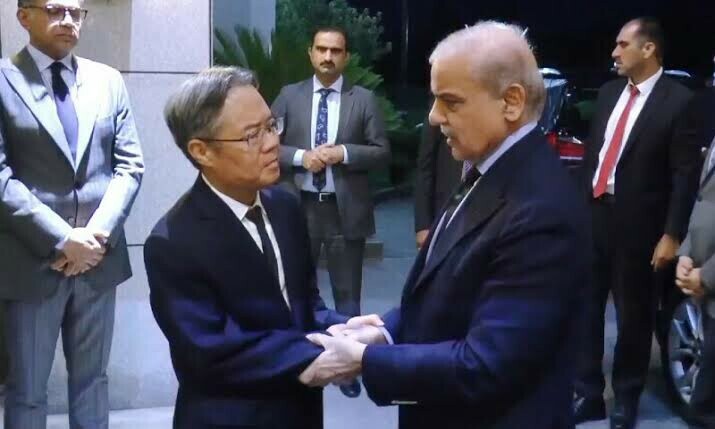
[ad_1]

• Spox says Jiang Zaidong’s recent remarks ‘perplexing in view of positive diplomatic traditions’
• Rejects Afghan ‘advice’ to negotiate with TTP, other terror groups; says Pakistan ‘fully qualified’ to join BRICS bloc
ISLAMABAD: In a rare public response to concerns raised over the security of Chinese nationals in Pakistan, Foreign Office Spokesperson Mumtaz Zahra Baloch on Thursday called a recent statement by Beijing’s ambassador to Islamabad “perplexing” and a stark departure from the longstanding diplomatic norms between the two nations.
“The statement from the Chinese ambassador is perplexing, especially considering the positive diplomatic traditions between Pakistan and China,” she said during the weekly media briefing.
The response to Ambassador Jiang Zaidong’s remarks — made at a conference held earlier this week to commemorate the 75th anniversary of the People’s Republic of China — is a rarity in Pakistan-China ties, as both sides rarely make such statements on public fora.
The statement also underscored the depth of concern within the FO over Ambassador Jiang’s remarks.
The recent escalation in violence against Chinese nationals has amplified Beijing’s security concerns, especially over progress on China-Pakistan Economic Corridor (CPEC) projects.
Earlier this month, a suicide attack near Karachi’s airport, claimed by the outlawed Balochistan Liberation Army (BLA), left two Chinese citizens dead and injured ten others.
In March, Chinese workers were targeted in Besham, reportedly carried out by affiliates of either Tehreek-i-Taliban Pakistan (TTP) or Islamic State-Khorasan (IS-K), resulting in five Chinese fatalities.
Speaking at the event ‘China at 75: A Journey of Progress, Transformation and Global Leadership’ on Tuesday, the Chinese envoy had expressed frustration over the attacks, stating it was “unacceptable” and urging Islamabad to strengthen security measures for Chinese nationals and crack down on anti-China elements.
“The security of Chinese citizens is paramount for President Xi,” he noted, adding that this priority has been reiterated in Xi’s discussions with Pakistani leaders.
During Prime Minister Li Qiang’s recent visit, conducted under what Jiang termed “unique circumstances,” because of two attacks on Chinese workers, China’s expectations for Pakistan to prioritise security were strongly emphasised. “Without a safe and secure environment, nothing can be achieved,” the Chinese envoy stressed.
Security concerns are also expected to be a central focus of President Asif Ali Zardari’s upcoming visit to China next week. Foreign Minister Ishaq Dar had previously indicated that Pakistani officials would directly update Chinese President Xi on the investigation into recent attacks on Chinese nationals.
However, the visit might be postponed after President Zardari sustained a foot injury during a visit to the UAE and has been advised complete rest for four weeks, according to the Presidency.
At Thursday’s briefing, the FO spokesperson reiterated Pakistan’s commitment to ensuring the security of Chinese nationals, which, she said, had been conveyed at the highest levels, most recently during Prime Minister Shehbaz Sharif’s meeting with Chinese Premier Li Qiang at the SCO Heads of Government meeting in Islamabad.
“We will continue to work closely with our Chinese counterparts to reassure them of Pakistan’s unwavering commitment to their security and well-being here,” she said, while referring to an ongoing dialogue on safety and security. Due to the sensitivity of the issue, she declined further comment when pressed for more details.
Afghanistan ‘advice’
Responding to a handful of questions about Afghanistan, the spokesperson reiterated that Pakistan “reject[s] any offers or advice with regards to dialogue between Pakistan and TTP”.
“Pakistan has absolutely no interest in talks with terror groups who are responsible for murder of Pakistani civilians and law enforcement officials,” she said.
When asked about claims by Afghan officials that their government was not involved in whatever is happening in Pakistan and that they do not back non-state actors, the spokesperson said Islamabad had provided Kabul with concrete evidence with regards to the TTP that are based in Afghanistan.
“The Afghan authorities have the primary responsibility to take action against the terror groups… and prevent the Afghan soil from being used against its neighbours,” she said.
BRICS
Speaking on Pakistan not being included in BRICS, the spokesperson emphasised the country’s strong qualifications to join the bloc of emerging economies, which expanded this year with new members from the Middle East and Africa.
“We believe that as a developing country and a proponent of inclusive multilateralism, Pakistan is fully qualified to becoming a member of BRICS,” Ms Baloch stated.
“We hope that BRICS will live up to its own commitment to inclusive multilateralism and accept Pakistan’s request for membership,” she added.
Last November, Pakistan announced its formal request to join BRICS, with Moscow voicing its support for Pakistan’s candidacy ahead of the Kazan Summit. Notably, however, the recent BRICS Summit decided to admit 13 new countries as dialogue partners—a step toward potential full membership—but Pakistan was not included, even as a dialogue partner.
The new dialogue partners include Algeria, Belarus, Bolivia, Cuba, Indonesia, Kazakhstan, Malaysia, Nigeria, Thailand, Türkiye, Uganda, Uzbekistan, and Vietnam. Earlier this year, four other countries — Egypt, Ethiopia, Iran, and the United Arab Emirates — became the first additions in BRICS’ initial expansion phase.
Published in Dawn, November 1st, 2024
[ad_2]
Source link






